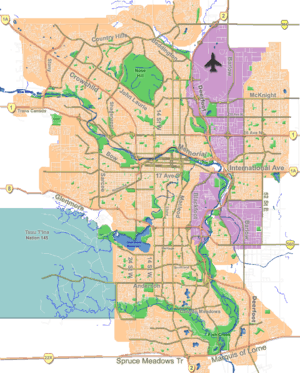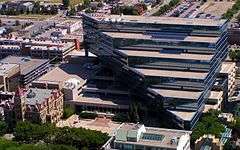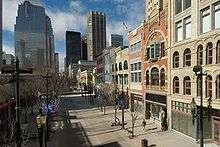Downtown Calgary
Downtown Calgary is a region of central Calgary, Alberta, it contains the second largest concentration of head offices in Canada.[3] The region is divided into several neighbourhoods, the Central Business District, Eau Claire, Chinatown, East Village, and the West End. There are a number of districts within Downtown Calgary as well, most of them being within the Central Business District.[4]
Downtown Calgary | |
|---|---|
Neighbourhood | |
 Downtown Calgary seen from the north | |
 Location of Downtown Commercial Core in Calgary | |
| Coordinates: 51°02′53″N 114°04′17″W | |
| Country | |
| Province | |
| City | |
| Quadrant | SW & SE |
| Wards | 7, 8 |
| Established | 1875 |
| Government | |
| • Mayor | Naheed Nenshi |
| • Administrative body | Calgary City Council |
| • Councillors | Druh Farrell Evan Woolley |
| Area | |
| • Total | 1.8 km2 (0.7 sq mi) |
| Elevation | 1,045 m (3,428 ft) |
| Population (2016)[2] | |
| • Total | 18,114 |
| • Density | 10,064.8/km2 (26,068/sq mi) |
| • Average Income | $30,126 |
| Website | Calgary Downtown |
Generally speaking, downtown Calgary is bordered by 14th Street W. on the west, the Bow River and Prince's Island Park on the north, the Elbow River on the east and the CPR mainline tracks on the south. The neighbourhoods of the Beltline and Mission to the immediate south are often considered part of downtown, due to the high concentrations of businesses, high population densities, and occurrence of retail and nightlife opportunities, but strictly speaking they are not technically part of downtown.
The population of Calgary's downtown has grown substantially in recent years, growing by several thousand between 2011 and 2016.[5] With the population of the five combined downtown neighbourhoods surpassing 18,000 as of 2016,[6] Downtown Calgary now has a significantly larger population than that of other Canadian cities of similar size, such as Ottawa and Edmonton.[7][8] While downtown Calgary continues to grow, the Beltline neighbourhood to the immediate south, with a population of 21,958 as of 2016, is taking up the majority of residential development in inner city Calgary.[9]
Calgary Transit's CTrain light rail system runs down 7th Avenue S. through the middle of downtown in an east-west direction, and the ride is free on this section. While the future Green Line of the CTrain will run underground through downtown under 2nd Street, running in a north-south direction.
Neighbourhoods
Commercial core
Calgary's dense business area comprises the bulk of the downtown community. It is a core of skyscrapers. As of February 2017, eight of the ten tallest buildings in western Canada, and a few of the tallest in the country, are in Calgary. It is arguably the densest downtown area of any city of its size in North America. Many of the buildings are connected via an 18 km (11 mi) long network of elevated walkways and bridges. The system, known as the "+15" is the largest of its kind in the world.
The area surrounding the Stephen Avenue Walk is Downtown Calgary's primary retail area. Stephen Avenue (8th Avenue SW) is a pedestrian mall lined with historic buildings containing stores, restaurants, cinemas, and drinking establishments. Immediately adjacent to the outdoor portion of Stephen Avenue is an indoor complex of two shopping malls. The malls, The Core Shopping Centre (formerly TD Square/Calgary Eaton Centre) and the Scotia Centre are bordered at either end by the historic Hudson's Bay Company store and Holt Renfrew's upscale department store. The street is also home to a number of galleries, restaurants, pubs, off-beat cinemas, and nightclubs. Other attractions in the commercial core include the Devonian Gardens in The Core, the Calgary Tower, the Art Gallery of Calgary, The Glenbow Museum, Olympic Plaza, Arts Commons, and the Telus Convention Centre.
The commercial core is also divided into a number of districts. They include the Entertainment District/Stephen Avenue, The Olympic Plaza and Cultural District, and the Government District.
Government district

The government district is an informal subdivision of the downtown core, and is centered along Macleod Trail, between the commercial core, Chinatown and Downtown East Village. It contains the City Hall, the Calgary Public Library, the Calgary Police headquarters, the Harry Hays building (federal government), Bow Valley College, the United States consulate and the Calgary Board of Education among other buildings.
Cultural district
The cultural district is centered on the Burns Building and Olympic Plaza, and contains educational and cultural venues such as Bow Valley College, Glenbow Museum and Arts Commons, including The Big Secret Theatre (home of One Yellow Rabbit theatre company), Jack Singer Concert Hall (home of Calgary Philharmonic Orchestra), Max Bell Theatre (home of Theatre Calgary), Martha Cohen Theatre (home of Alberta Theatre Projects), and Engineered Air Theatre.
A statue of The Famous Five stands between Stephen Avenue and Olympic Plaza.
Entertainment district

The entertainment district is located along 8th Avenue South. It contains the pedestrian mall of Stephen Avenue, lined with restaurants and shops, enclosed shopping centres (including The Core, Scotia Centre, Bankers Hall and The Bay), as well as Calgary's only art house movie theater (the Globe Cinema) and recreation areas such as the Devonian Gardens. Landmark buildings found in this district include the Hyatt Regency Hotel, which incorporates several historic buildings into its facade, the Calgary Marriott and Fairmont Palliser Hotel. Landmark skyscrapers in this district are Scotia Centre, Bankers Hall, and Eighth Avenue Place.
The "Udderly Art Legacy Pasture", a collection of decorated fiberglass cows built in 2000,[10] is hosted mainly in the Centennial Parkade, while other particular exponates are spread throughout the city.
East Village

The East Village is an area to the east of the Downtown Commercial Core. This area was plagued by crime and homelessness for a long time. However, the area has seen a great amount of redevelopment since the late 2000s. In 2007, the Calgary Municipal Land Corporation began construction on $357 million worth of infrastructure upgrades to the neighbourhood, bringing all streets above flood plain levels, upgrading sewers and storm drains, and building plazas.
The neighbourhood has since become a new hot-spot for the downtown area, playing host to the award-winning RiverWalk, several restaurants in the historic Simmons Mattress Factory building, and several new condo towers, with several more under construction. The neighbourhood is host to the $191 million National Music Centre of Canada, and will be host to the $245 million New Central Library of the Calgary Public Library system. Since the redevelopment has started, the neighbourhood has seen $2.7 billion worth of investment.[11]
West End
The West End is a high-rise, high-density residential neighbourhood to the west of the Downtown Commercial Core. The neighbourhood is home to Millennium Park, which plays host to a large skate park, and is the home of the Calgary Pride celebration every September. The Downtown West - Kerby C-Train station serves the community. Downtown West End is also well connected into the Plus 15 skywalk system.
Chinatown
Chinatown is located directly north of the Downtown Commercial Core and northwest of the East Village. The neighbourhood is characterized by high-density living and a high density of East Asian retail and restaurants. Calgary's Chinatown is home to the largest Chinese Cultural Centre in North America. Designed in a traditional style, the cultural centre's roof is modelled after the Temple of Heaven in Beijing. Chinatown Calgary has an area redevelopment plan in place with work continuing towards revitalizing the neighbourhood. The neighbourhood also contains Dragon City Mall, the only traditional Chinese-inspired shopping mall in Alberta.
Eau Claire
Eau Claire is a neighbourhood located directly north of the Downtown Commercial Core. The area, which was developed from reclaimed industrial land, fronts the Bow River and sits immediately north of 3rd Avenue South. North of Eau Claire is Prince's Island Park, a large urban park on an island in the Bow River and the site of many summer festivals, including the Calgary Folk Music Festival, Carifest, Shakespeare in the Park and various busking happenings. Within Eau Claire is Eau Claire Market and a variety of pubs and restaurants. It is also located on the city's large network of pedestrian pathways and trails, along the Bow River pathway.
Demographics
In the City of Calgary's 2016 municipal census, Downtown Calgary had a population of 18,114 living in 12,455 dwellings, a 0.6% increase from its 2015 population of 18,011.[12] With a land area of 1.8 km2 (0.69 sq mi), it had a population density of 10,060/km2 (26,100/sq mi) in 2016.[12][13]
Residents in this community had a median household income of $30,126 in 2005 with 41.4% of the population reported as low income residents.[2] As of 2006, 44.3% of the residents in the commercial core were immigrants. A proportion of 99.7% of the buildings were condominiums or apartments, and 95.9% of the housing was used for renting.[2]
See also
- List of neighbourhoods in Calgary
- List of attractions and landmarks in Calgary
- List of tallest buildings in Calgary
References
- "Calgary Elections". City of Calgary. 2017. Retrieved November 12, 2017.
- City of Calgary (2012). "Downtown Commercial Core Community Statistics" (PDF). Retrieved 2013-08-03.
- "State of the West 2010: Western Canadian Demographic and Economic Trends" (PDF) (PDF). Canada West Foundation. 2010. pp. 65 & 102. Archived from the original (PDF) on July 14, 2011. Retrieved February 16, 2017.
- Downtown Calgary Association (2005). "Downtown Districts". Archived from the original on October 6, 2007. Retrieved 2017-02-16.
- Global News and Statistics Canada (2017). "Population Change 2011 - 2016". Retrieved 2017-02-16.
- City of Calgary (2016). "Comparative Community Results" (PDF). Retrieved 2017-02-16.
- (Census tract number 5050048.00) http://www12.statcan.gc.ca/census-recensement/2016/dp-pd/hlt-fst/pd-pl/Table.cfm?Lang=Eng&T=1601&SR=51&S=94&O=A&RPP=25&PR=0&CMA=505&CSD=0
- "Neighbourhoods". City of Edmonton. Retrieved February 16, 2017.
- SkyscraperPage (2017). "Development Map Calgary". Retrieved 2017-02-16.
- View Calgary (2000). ""Udderly Art" Exhibition". Retrieved 2007-06-01.
- "Construction". EV Experience. Retrieved February 16, 2017.
- "2015 Civic Census Results" (PDF). City of Calgary. 2015. Retrieved February 16, 2017.
- "Community Boundaries" (Esri shapefile). City of Calgary. Retrieved February 16, 2017.
External links
| Wikimedia Commons has media related to Downtown Calgary. |
